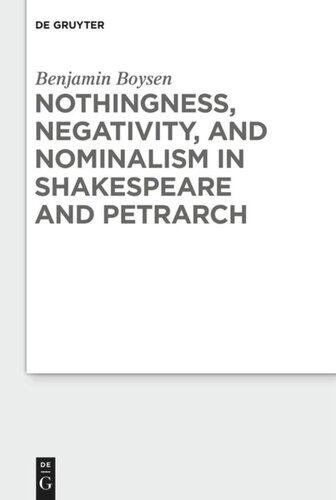

Most ebook files are in PDF format, so you can easily read them using various software such as Foxit Reader or directly on the Google Chrome browser.
Some ebook files are released by publishers in other formats such as .awz, .mobi, .epub, .fb2, etc. You may need to install specific software to read these formats on mobile/PC, such as Calibre.
Please read the tutorial at this link: https://ebookbell.com/faq
We offer FREE conversion to the popular formats you request; however, this may take some time. Therefore, right after payment, please email us, and we will try to provide the service as quickly as possible.
For some exceptional file formats or broken links (if any), please refrain from opening any disputes. Instead, email us first, and we will try to assist within a maximum of 6 hours.
EbookBell Team

5.0
20 reviewsBeing exposed to the Nominalist expansion in early modernity, Petrarch and Shakespeare are highly preoccupied with a Nominalist dimension of language and representation.
Against this background, the study shows how these Renaissance poets advanced a special notion of subjectivity and identity as rooted in negativity, otherness, and representation.
The book thus argues for a new understanding of negative modes of subjectivity in Petrarch and Shakespeare. A new and sharpened understanding emerging from an interpretation of Francesco Petrarch’s notion of exile and of love in his great poetical cycle Rerum vulgarium fragmenta as well as a meticulous examination of the concept of nothingness in William Shakespeare’s works.
Petrarch and Shakespeare poetically show how identity is alien and decentred – yet also free and expanding. In other words, these poets illustrate how subjectivity is constituted by heterogeneity. Moreover, pointing to other examples of this negative subjectivity in Renaissance philosophy and poetry, the study suggests that these models for subjectivity could be extended to other early modern writers.